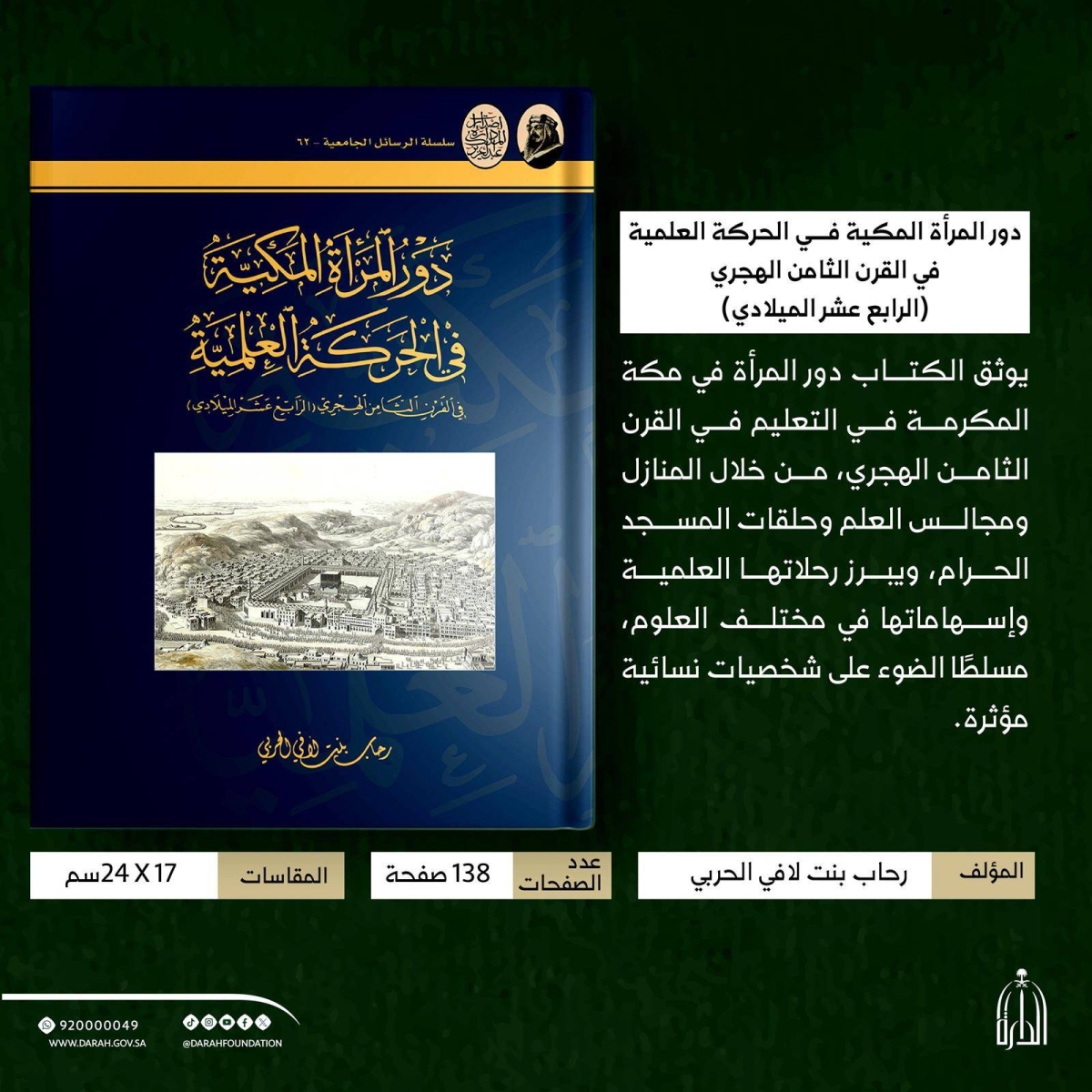The King Abdulaziz Foundation has recently released a scholarly publication titled “The Role of Meccan Women in the Scientific Movement During the 8th Hijri Century (14th Century CE),” which highlights the scientific contributions of women in Mecca during one of the prominent eras of its intellectual history.
This publication is part of the Foundation’s efforts to document the historical roles of women in Islamic society and to emphasize their status in the journey of knowledge and learning, particularly in Mecca, which served as a scientific hub attracting scholars and students of knowledge from various parts of the Islamic world during that period.
The book examines the educational environments in which women were active at the time, most notably homes, scholarly gatherings, and study circles in the Grand Mosque. It also reviews women’s attainment of scholarly certifications, their travels in pursuit of knowledge, their teaching methods, as well as their contributions to the fields of Sharia, language, and history.
The publication addresses examples of women who played influential roles in the scientific activity in Mecca during the 8th Hijri century, relying on a rigorous historical methodology based on authentic sources from biographical, travel, linguistic, and geographical books, while arranging the female figures mentioned in the book according to chronological order of birth or death.
The book is available through the e-store via the King Abdulaziz Foundation’s digital portal, in addition to the Foundation’s sales centers and authorized distributors.
King Abdulaziz Foundation
The King Abdulaziz Foundation for Research and Archives (Darah) is a major cultural and research institution in Riyadh, Saudi Arabia, established in 1972 to preserve the nation’s history. It is dedicated to documenting the history of the Kingdom, with a special focus on the era of its founder, King Abdulaziz Al Saud, and serves as a leading center for historical research and archives.
Mecca
Mecca is the holiest city in Islam, located in Saudi Arabia, and is the birthplace of the Prophet Muhammad. It is the site of the Masjid al-Haram mosque, which contains the Kaaba, the most sacred shrine in Islam that Muslims believe was built by Abraham and his son Ishmael. Every year, millions of Muslims perform the Hajj pilgrimage to Mecca, a religious duty that must be carried out at least once in their lifetime.
Grand Mosque
The Grand Mosque is a common name for major mosques in many Islamic countries, with the most famous being Masjid al-Haram in Mecca, Saudi Arabia. It is the largest mosque in the world and surrounds the Kaaba, Islam’s holiest site, making it the focal point for the Hajj pilgrimage. Its history dates back centuries, with continuous expansions to accommodate the millions of worshippers who visit it annually.
Sharia
“Sharia” is not a physical place but rather the Islamic religious law derived from the teachings of the Quran and the Hadith. It provides a moral and legal framework for many aspects of Muslim life, including daily routines, familial responsibilities, and financial dealings. Its interpretation and application have evolved over centuries and vary across different schools of Islamic thought and cultural contexts.
Islamic society
“Islamic society” refers to the global community of Muslims bound by shared religious beliefs, practices, and cultural traditions rooted in the teachings of the Qur’an and the Prophet Muhammad. Historically, it has been the foundation for numerous powerful empires and caliphates, which were centers of immense scientific, philosophical, and artistic advancement. Today, it encompasses a diverse array of cultures and nations united by the common principles of Islam.
scholarly gatherings
“Scholarly gatherings” refer to academic conferences, colloquia, and symposia where scholars meet to present and discuss research. This tradition dates back to ancient forums and medieval universities, formalizing in the 17th century with the rise of scientific societies. These events remain fundamental for disseminating knowledge, peer review, and fostering intellectual collaboration across disciplines.
study circles
“Study circles” are a form of adult education and popular movement originating in 19th-century Sweden, designed to promote democratic dialogue and collective learning. They are characterized by self-organized groups of people who meet regularly to study a particular subject in an informal, non-hierarchical setting. This tradition has since spread globally, becoming a foundational method for community education and social change.
e-store
An e-store (electronic store) is not a physical place but a modern commercial website or online platform where goods or services are bought and sold. It emerged with the commercialization of the internet in the 1990s, pioneered by companies like Amazon and eBay, and has since revolutionized global retail.





